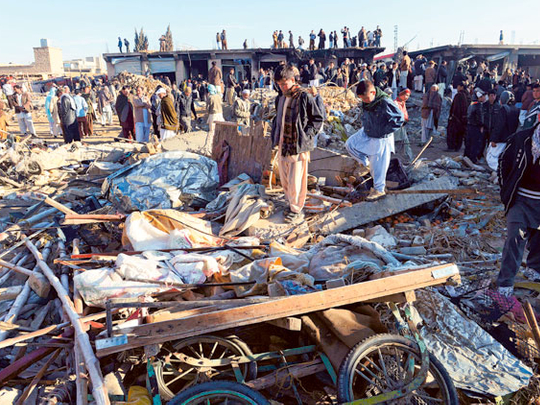
The ruthless targeting of the Shiite Hazara in the provincial capital of Quetta in Balochistan on February 16 marks another sad chapter for Pakistan.
Though sectarian conflict is not a new phenomenon, the nature of the attacks and the wider encompassing of victims, including women and children, is extremely disturbing. On the other hand are the visible signs of progress in society as more and more people are openly denouncing terrorism and embracing education and social alleviation plans to bring about change.
The Quetta carnage that killed 89 and injured 200 reflects this dichotomy starkly, leaving a trail of questions in its wake.
But the key issues that need to be addressed clearly show how militant outfits — whether it’s Sipah Sahaba that later morphed into Lashkar-e-Jhangvi or Tehrik-e-Taliban Pakistan — will continue to destabilise the state, unless concerted efforts are taken to root them out once and for all. Any government that cannot provide its citizens security, irrespective of their ideological inclination or ethnic affiliations, needs to not only review but address the deficiencies.
It is extremely unfortunate that things have come to a boiling point. Demands being made by the Shiite community, not just in Balochistan but countrywide, for the army to take control of the province and target the extremists are indicative of a collapse in governance and law and order.
The Supreme Court has already started proceedings in the Quetta killings and is likely to increase pressure on the government. What the Pakistan Peoples Party government does at this point is crucial. It is currently engaged in hobbling together a caretaker setup to take over the reins in March. However, the lack of trust and confidence in the government is now at a record high. What is particularly disturbing is how all those in authority are blaming everyone but themselves and refusing to take any responsibility whatsoever. At least, until the time of writing, nobody has offered to resign. For Balochistan Governor Zulfiqar Khan, the local security forces in his words were either “too scared or clueless” to act despite being given a free hand to take action against extremists.
The Sunni militant outfit, LeJ, banned since 2001 in Pakistan and deemed a terrorist organisation by the United States may have found fertile ground in Balochistan to target Shittes and dig its heels in to spread ideological militancy, which to date has been absent from this part.
The dual terror attacks in January had resulted in the sacking of chief minister Mir Mohammad Aslam Khan Raisani when Islamabad faced tremendous pressure to hold him accountable. It is ironic that even under governor’s rule, a similar incident occurs, but one that involves women and children. The extent and gruesome nature of this attack has gathered momentum by the minute, with citizens of all stripes demanding an immediate end to what they term a ‘Shiite Genocide’.
Ironically, Monday, was a day Pakistan officially handed over Gwadar Port to Chinese authorities but it was marked by unprecedented rage. A few kilometers from the heart of the capital where Palestinian President Mahmoud Abbas was being welcomed and promised unstinting support for an independent Palestinian state, public outrage erupted, bringing most parts of the capital to a halt. What’s more, social networking sites and mobile messages are being mobilised in support, urging people to join the protests. More disturbing is the nightmarish repeat of the previous attack as the victims’ families are reportedly refusing to bury the dead until the attackers are arrested and army rule brought in.
What should sound alarm bells for the PPP government is the impact on its electoral future. It seems that any hope for survival and security that minority and sectarian groups have is now focused on the army and the judiciary. This does not bode well for the only democratic government that enjoyed a full five-year term. The biggest question then is what can be done in Quetta at this juncture and in view of the sectarian killings? First and foremost a country-wide crackdown aimed at arresting the culprits. Second, all cells and sub-organisations affiliated with the sectarian militant outfits need to be eliminated to end their support bases.
Importantly, the Quetta tragedy could play a role in delaying elections based on the security situation. Peshawar itself has been racked by a number of terror attacks targeting the political administration and security institutions over the past few weeks. The latest attack on Monday involving two suicide bombers at the office of the political agent of Khyber agency in Peshawar, killed six — hardly a conducive atmosphere for elections when every rally is likely to be a security nightmare. The offer to hold peace talks by the TTP that also has close ties with LeJ has still not had a viable response from the government but that may be a deliberate political move to delay taking such a decision.
All critical matters, especially the ones’ pertaining to security and those prompting divisive public opinion, are usually not touched before elections.
While the bloodshed may yet continue, the important thing to realise is the shift in dynamics. There is zero tolerance for terrorism and growing apathy for a leadership that has failed to provide security or governance. This is something the politicians must remind themselves of with every passing day as they brace for a new electoral phase. Pakistan was meant to be a safe haven for its minorities too. It is time the country’s politicians learn to read the grim future in the splattering of blood in Quetta and turn the tide before it is too late.









